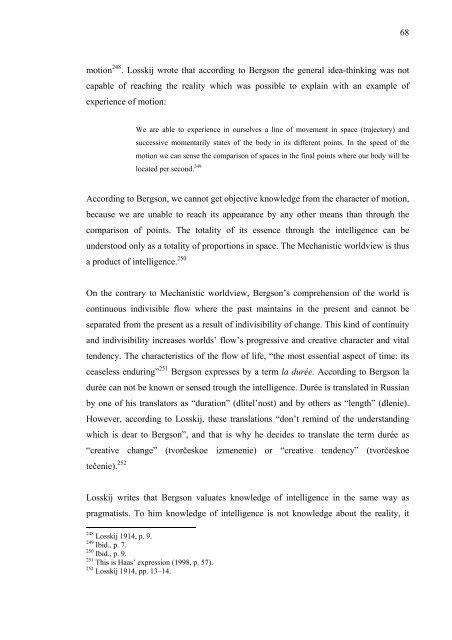Boris Asaf'ev and the Soviet Musicology - E-thesis
Boris Asaf'ev and the Soviet Musicology - E-thesis
Boris Asaf'ev and the Soviet Musicology - E-thesis
Create successful ePaper yourself
Turn your PDF publications into a flip-book with our unique Google optimized e-Paper software.
motion 248 . Losskij wrote that according to Bergson <strong>the</strong> general idea-thinking was not<br />
capable of reaching <strong>the</strong> reality which was possible to explain with an example of<br />
experience of motion:<br />
We are able to experience in ourselves a line of movement in space (trajectory) <strong>and</strong><br />
successive momentarily states of <strong>the</strong> body in its different points. In <strong>the</strong> speed of <strong>the</strong><br />
motion we can sense <strong>the</strong> comparison of spaces in <strong>the</strong> final points where our body will be<br />
located per second. 249<br />
According to Bergson, we cannot get objective knowledge from <strong>the</strong> character of motion,<br />
because we are unable to reach its appearance by any o<strong>the</strong>r means than through <strong>the</strong><br />
comparison of points. The totality of its essence through <strong>the</strong> intelligence can be<br />
understood only as a totality of proportions in space. The Mechanistic worldview is thus<br />
a product of intelligence. 250<br />
On <strong>the</strong> contrary to Mechanistic worldview, Bergson’s comprehension of <strong>the</strong> world is<br />
continuous indivisible flow where <strong>the</strong> past maintains in <strong>the</strong> present <strong>and</strong> cannot be<br />
separated from <strong>the</strong> present as a result of indivisibility of change. This kind of continuity<br />
<strong>and</strong> indivisibility increases worlds’ flow’s progressive <strong>and</strong> creative character <strong>and</strong> vital<br />
tendency. The characteristics of <strong>the</strong> flow of life, “<strong>the</strong> most essential aspect of time: its<br />
ceaseless enduring” 251 Bergson expresses by a term la durée. According to Bergson la<br />
durée can not be known or sensed trough <strong>the</strong> intelligence. Durée is translated in Russian<br />
by one of his translators as “duration” (dlitel’nost) <strong>and</strong> by o<strong>the</strong>rs as “length” (dlenie).<br />
However, according to Losskij, <strong>the</strong>se translations “don’t remind of <strong>the</strong> underst<strong>and</strong>ing<br />
which is dear to Bergson”, <strong>and</strong> that is why he decides to translate <strong>the</strong> term durée as<br />
“creative change” (tvorčeskoe izmenenie) or “creative tendency” (tvorčeskoe<br />
tečenie). 252<br />
Losskij writes that Bergson valuates knowledge of intelligence in <strong>the</strong> same way as<br />
pragmatists. To him knowledge of intelligence is not knowledge about <strong>the</strong> reality, it<br />
248 Losskij 1914, p. 9.<br />
249 Ibid., p. 7.<br />
250 Ibid., p. 9.<br />
251 This is Haas’ expression (1998, p. 57).<br />
252 Losskij 1914, pp. 13–14.<br />
68

















